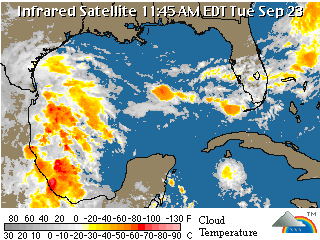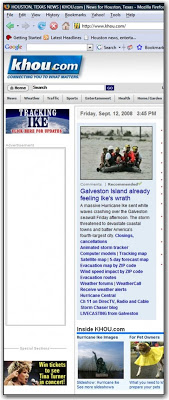
 ‘The four local stations in Houston used the Internet to extend their reach, streaming their exhaustive coverage online and drawing viewers around the world’
‘The four local stations in Houston used the Internet to extend their reach, streaming their exhaustive coverage online and drawing viewers around the world’
By Brian Stelter / September 21, 2008
See ‘Coping with Ike by using a full charge of ingenuity’ by Dwight Silverman, below.
In the aftermath of Hurricane Ike, the national media’s attention was quickly diverted by the financial crisis and the presidential election last week. But the four local stations in Houston used the Internet to extend their reach, streaming their exhaustive coverage online and drawing viewers around the world by providing an alternative to the chatter on cable news.
“The reach of local broadcasters has never been greater,” Keith Connors, the news director for KHOU, the CBS affiliate in Houston, said in a telephone interview Saturday night. He said the station’s Web site had seen “incredible amounts of streaming.”
The Houston stations have barely had time to catch their breath since Ike made landfall early on the morning of Saturday, Sept. 13, and knocked out power to most of the Houston metropolitan area. They have extended their local newscasts to update viewers on damage assessments, power outages and relief efforts.
“I’ve told our people to approach this as a public utility,” Mr. Connors said.
National networks quickly moved from Ike to the Wall Street quake last week. “I’m hearing from friends around the U.S. that surprisingly little information about Ike is being broadcast or printed,” Skip Valet, the news director for KPRC, the NBC affiliate in Houston, wrote in an e-mail message to the “NBC Nightly News” anchor Brian Williams last Wednesday. Mr. Williams reprinted the message on his blog Thursday, and on Friday said he would travel to Texas soon.
As the hurricane approached on Friday, Sept. 12, the KHOU Web site drew more than 8 million page views and 250,000 views of the channel’s live stream. The next day, the site recorded about 9.2 million page views and 225,000 streams.
The video viewing continued, to a lesser degree, last week. The station received e-mail messages from viewers in Australia, Belgium, India, Norway, Saudi Arabia and elsewhere, thanking them for the video stream. Houston evacuees also said they watched the online streams to stay informed.
At KPRC, Mr. Valet said the station’s Web site had averaged five million page views a day “as people watch all of the wall-to-wall coverage.”
Source / New York Times
Coping with Ike by using a full charge of ingenuity
By Dwight Silverman / September 22, 2008We live in the Age of Machines.
Machines do the jobs humans won’t. They cook our food, they clean our clothes, they transport us, they facilitate communication, they entertain.
They all require energy of some sort, and in the Houston area, for many people that energy went away on Sept. 13. Hurricane Ike rolled in and stopped the machines, or at the very least, made them less available for many who lost power or couldn’t find gasoline.
It’s almost trite to say that an event like Ike changes a community, that those who live it come away with a different perspective. But trite is true in this case. Houston and its surrounding communities will never be the same.
I’ve built my life around technology, and I was reminded again of its fragility. As have many of my friends and neighbors, I’ve been scrambling to find power when not at work to keep my devices charged, and to find available Internet connections to get things done.
For example, I have to chuckle at the early mythology of the Internet as having been designed to withstand an atomic attack (something that, by the way, is not true). Anyone who is still waiting for Comcast or AT&T to bring broadband back to their Southeast Texas neighborhoods understands how laughable that is. Take away the electricity that powers it and break the wires that carry its data, and the Internet vanishes.
‘City of MacGyvers’
I’ve been impressed, though, at the way people have been making do. In an essay last week, Kyrie O’Connor — deputy managing editor for features and pop-culture blogger — called Houston “a city of MacGyvers,” a reference to the TV character known for his ability to make a thermonuclear bomb out of saltines and fishing line. Indeed, we have been nothing if not resourceful. I asked the commenters in my TechBlog to provide some examples of their geek coping skills.
From Stevemb: “My car’s battery has proven to be a vital power source. To deal with the lack of electricity and still remain ‘plugged in’ without an expensive generator, I’ve come to rely on a 12 volt DC power inverter — and Verizon’s broadband access on our Smartphone. The inverter provides 2 AC plugs, which are split off to provide juice to my laptop’s AC adapter. The other plug either runs a regular lamp with a low wattage fluorescent bulb, our TV or even a fan.”
From Marc Nathan: “Knowing that we would be out of power, I paid most of my monthly bills on Friday afternoon and loaded all of my account numbers onto a USB thumb drive that I kept on my key chain. This was in the hopes that I could find a Wi-Fi point somewhere if it came down to that.”
From Cheri Lindsey: “I found that Kroger and Jack in the Box have free Wi-Fi. So I plugged my laptop into the car outlet to charge and sat in the parking lot in order to get online and tell our loved ones we were all right. We also charged our cell phones and iPod in my car. I drive a Honda, so it wasn’t even using much gas to do that. It made me feel that I wasn’t wasting gas in order to be productive and communicating with the family.”
From Lynda: “Put gas in all three vehicles and stocked up on junk food. We used the same trusty 400w inverter that got us through Alicia. Resurrected the HD antenna and put it on the roof Saturday afternoon. We actually watched all the hurricane coverage in high definition. Had a 12-volt fan to run at night so we could sleep. The inverter wasn’t enough to run the fridge, so we started cooking stuff Sunday night. Who would have guessed that you could bake chocolate chip cookie dough on the propane grill? … We both have Verizon broadband cards so we had Internet.”
Some plans fizzle
David Neal found an uninterruptible power supply useful: “Beyond generators and inverters, you can also use a UPS. Go buy a $150-$200 data-center quality UPS, charge it at work and drag it home each night. This will give you enough power to run a fan or two and keep cool until power is restored. And unlike a generator, you’ll be able to use it when the power returns!”
Of course, not everyone’s plans worked out so well. From Brian Perez: “I thought I was prepared for the storm. Plenty of gas and extra. Spam enough to feed an army for weeks. Batteries out the wazoo. Camping equipment and my trusty American Redcross crank radio. Day one went great. Then the iPhone 3g started running out of juice, and I found out too late my car charger was ‘incompatible’. Antenna fell off the radio. And I didn’t clean out the fridge. Big mistake.”
Automobiles and inverters
Note the common thread in these comments, which were typical of the 30 or so I received? They all used some form of tech to solve the problem being being without other kinds of tech. Automobiles and inverters are the way to go if you don’t have a generator.
But even that is a thin lifeline. Your car must be working, and gas must be available. Gasoline station pumps require electricity to work. And tank trucks must be able to get to the gas stations to supply them.
Key parts of modern society are built on technologies that falter too easily. We can cope so long as we know it’s temporary, or if some components of the technological house of cards remain standing. If Ike had been much worse, much more would have been lost.
Are we ready for that?
Source / Houston Chronicle


















I truly enjoyed this article and how it make me ‘think twice’.
My youngest sister was called to Houston since she is an insurance adjuster and deals only with disaster claims. She will turn 47 years old in November; she’s not a youngster, but she called to tell me she’s never seen anything so devastating in her life.
At the same time, she said she was amazed how wonderfully all these people area dealing with this major devastation and their good nature and humor that is threaded throughout their conversations.
She says she’s proud to be an American; she’s glad to be included not as a victim, but a person who will work on behalf of the victim, and how much more she will appreciate the fact her home has remained safe from such a catastrophe.
I do hope one day PBS will air a documentary on this; from the humane standpoint – individual cases, and instances similar to just what you posted here. We could all benefit from this; real profiles in courage. /ds